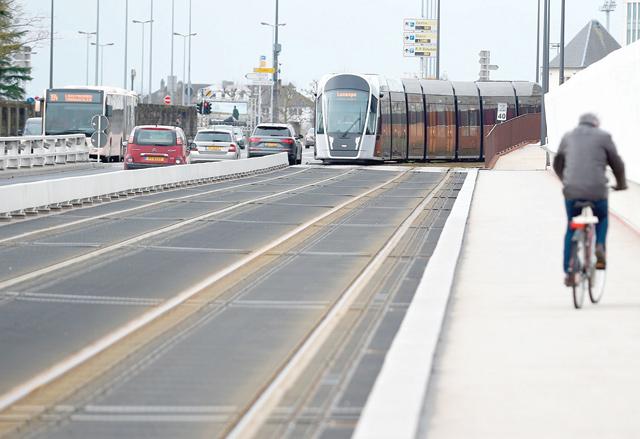You are here
Truckers warn of cost of new European border checks
By AFP - Sep 20,2015 - Last updated at Sep 20,2015
BERLIN — Truckers are warning of the threat of significant costs to the road haulage industry as European nations reimpose long-abandoned border controls to check the greatest migratory flow across the continent since World War II.
Frontier checks that had been swept away in much of Europe to allow free travel are returning to block the path of vast numbers of people seeking refuge, many from Syria, Iraq and Afghanistan.
Germany, Austria and Slovakia have all reimposed identity checks on parts of their borders, and Poland and the Netherlands are considering whether to follow suit.
Hungary's riot police this week fired water cannon at migrants on its newly-shuttered border with Serbia, and troops completed a 41-kilometre barbed-wire barrier along part of its frontier with Croatia.
The threat to the Schengen area, a single zone with borderless travel between 26 states, has an incalculable humanitarian cost. But it has a financial price, too.
"We are experiencing delays for all our trucks. It is the same thing for everyone in the industry," said Cora Buegenburg, operations manager at Allgeier Translog, a German transport group whose lorries drive across the European road network.
"At the moment there are traffic jams everywhere," she added. "But taking alternative, longer routes means extra costs."
Germany set up border checks along its frontier with Austria a week ago to control the human tide. Austria and Slovakia followed. Now Germany is also strengthening its borders with France and the Czech Republic.
Since Monday, massive traffic jams have formed in Germany and Austria.
Disruption ahead
When trucks are delayed they unload goods late, and are slower to pick up new cargo. It can quickly lead to capacity shortfalls, Buegenburg indicated. "And that pushes up prices."
The slowdown at national borders comes at a time of tight capacity on the European transport network because of an increase in trade, said Sebastian Lechner, managing director of the federation of Bavarian transporters.
Bavaria, the region in southern Germany that has been hardest hit by border checks so far, is crisscrossed by major European transport routes, added Lechner.
All the goods traffic from Italy, a major German trade partner, transits Austria and Bavaria, he remarked.
And as long as the tide of migrants flows towards Europe, it is impossible to predict the scale or duration of the disruption.
If controls were to be established along all the borders of the Schengen area, the loss in earnings for Dutch transport companies alone would amount to 600 million euros ($684 million) a year, assuming a one-hour delay for each border, indicated Renee Reijers, spokeswoman for the Dutch association for transport and logistics.
"More broadly, the return of border controls is a big blow to European competitiveness," the association said.
US and Chinese road hauliers can make long-haul trips without the extra cost of border delays, making industrial products more competitive, it added.
In the European Union, about three-quarters of goods traffic goes by road, with rail far behind.
Traffic snarls
For Doriano Bendotti, secretary of the north Italian Bergamo section of Italy's road hauliers association, traffic slowdowns had increased in the border region along Germany, Hungary and the Czech Republic.
"But we are not in an emergency situation," he said.
Transport costs to Britain had already climbed because of heightened security procedures in the French port of Calais, he added. Migrants daily try to cross from Calais to Britain, often by smuggling themselves into the backs of trucks.
Traffic snarls are a day-to-day part of the business, said the German association of freight forwarders and logistics. And they can be compensated for in part by planning longer journey times.
Nevertheless, "when a driver is stuck in a traffic jam it is paid work time", the association added. "If the border checks last weeks or longer, then companies in the industry will have to speak to their customers about adjusting prices."
Related Articles
LILLE, France — Despite London and Brussels reaching a trade deal to limit the fallout of Brexit the flow of people and goods across the Cha
CALAIS, France/BUDAPEST — Hundreds of migrants poured overnight onto the high-speed railway linking Paris with London near the French port o
LUXEMBOURG — Luxembourg on Saturday became the first country in the world to offer free public transport, as the small and wealthy EU countr


















